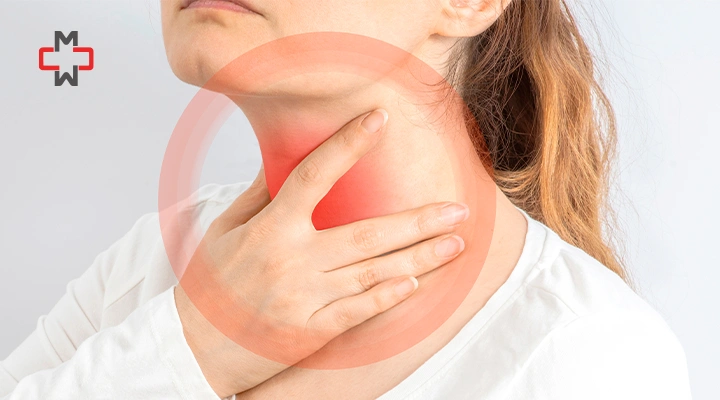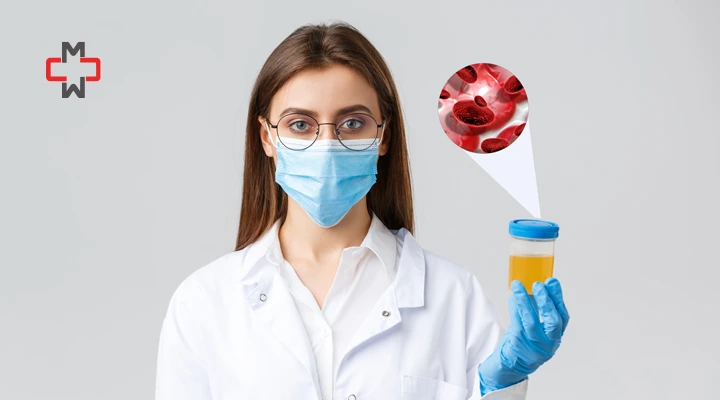Skin Allergy Testing in NYC
Find Your Triggers. Reclaim Comfort.
Led by Dr. Syra Hanif, our in-house Allergist and Skin Allergy Expert, our team brings years of clinical experience in allergy care and dermatologic diagnostics.
At Manhattan Medical Arts, we offer advanced skin allergy testing to help uncover what’s really causing your symptoms—whether it’s a persistent rash, seasonal sneezing, or food-related reactions. With expert-led diagnostics and compassionate care, we deliver accurate answers and custom Allergy Treatment plans.
What Is a
Skin Allergy Test?
A skin allergy test checks your body’s immune response to suspected allergens—substances that your immune system may mistakenly treat as threats. These can include:
Pollen, Mold, and
Dust Mites
Pet
Dander
Foods (Nuts, Dairy,
Shellfish)
Insect
Venom
Latex and Other
Chemicals
Medications
We apply tiny amounts of these substances to your skin and watch for allergic reaction signs to pinpoint your specific triggers. This is part of our broader process of allergy diagnosis and allergen identification.
Types of Skin Allergy Tests
We Offer
Our board-certified specialists in dermatology and allergy care perform the following:
Skin Prick
(Scratch) Test
- Drops of allergens applied to your skin
- A sterile lancet is used to lightly prick the surface
- Reactions measured within 15-20 minutes
- Most common test for environmental and food allergies
- Also known as skin prick testing
Intradermal
Test
- Small amounts of allergen injected just under the skin
- Results read after 15-30 minutes
- Ideal for detecting medication or insect venom allergies
Patch
Test
- Patches with allergens are placed on your back or arm
- Worn for 48-96 hours
- Detects delayed reactions linked to contact dermatitis (e.g., soaps, metals, hair dyes)
- Also referred to as an allergy patch test or patch testing
When Is It Recommended?
Allergy Testing may be recommended if you have:
- Hay fever (allergic rhinitis)
- Asthma triggered by allergens
- Chronic eczema or contact dermatitis
- Unexplained hives or urticaria
- Reactions to foods, medications, or insect stings
- Skin conditions related to hypersensitivity
Note: If you have had a severe allergic reaction (anaphylaxis), certain medications, or skin conditions like eczema, a blood allergy test may be more appropriate.

What to Expect:
Before, During & After Skin Allergy Test

How to Get a Skin Allergy Test
- Schedule an appointment online or by phone
- Clinical evaluation includes reviewing your skin allergy symptoms, history & treatments
- Physical exam may help pinpoint likely allergens
Test Preparation
- Avoid antihistamines, tricyclic antidepressants, and certain antacids as directed
- Inform us about all medications you’re taking
- Skip lotions or creams on the test area
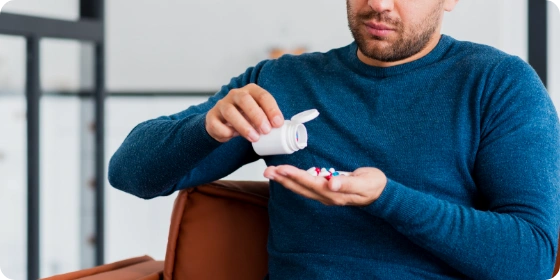
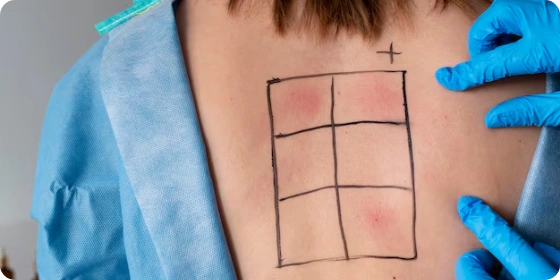
During the Test
- Test takes 20–90 minutes depending on type
- Performed on forearm or upper back
- Quick, mild pricks—no bleeding and minimal discomfort
Post-Test Care
- Mild redness, itching, or wheals may appear
- Patch tests require follow-up visit after 48–96 hours
- Positive results = raised, red, itchy bumps (wheals)
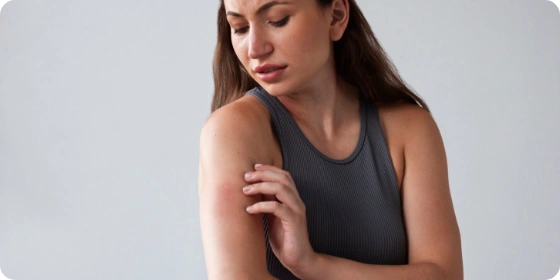
How to read Allergy
Skin Test Result
What Does a Positive Result Look Like?
Raised, red, itchy wheal (like a mosquito bite)
The larger the wheal, the greater the sensitivity
This helps in how to read allergy skin test results accurately
Allergy Skin Test
Results Chart
Wheal Size
Interpretation
< 3 mm
Negative / no allergy
3–5 mm
Mild sensitivity
5–8 mm
Moderate allergy
> 8 mm
High sensitivity
Accuracy
- Skin Prick Tests
~85–90% accurate for airborne allergens - False positives and false negatives are possible, so clinical history is key
Is It Covered by Insurance?
Yes—allergy testing is typically covered by most insurance plans when medically necessary. We’ll verify your benefits and discuss any out-of-pocket costs upfront.
Skin Allergy Testing
Near Me
West Village
492 6th Avenue, New York, NY 10011
Forest Hills
72-14 Austin St, Queens, NY 11375
Ready to stop guessing and start healing? Get tested today.
Frequently Asked Questions
How long does a skin allergy test take?
Depending on the type, it can take between 20 and 90 minutes. Skin prick tests are the fastest, while patch tests may require 48–96 hours for full results.
Are skin allergy tests painful?
Not at all. The testing uses tiny lancets that barely penetrate the skin. Most patients report only mild, momentary discomfort.
Can I shower after my allergy test?
Yes, but if you’ve had a patch test, you’ll need to avoid showering and sweating until the patches are removed and evaluated.
What if my test results are unclear?
Inconclusive results may require follow-up testing, such as intradermal tests or IgE blood tests, depending on your symptoms and health history.
Will I need treatment after testing?
If you’re diagnosed with allergies, our team will create a personalized allergy treatment plan that may include medications, lifestyle changes, or immunotherapy (allergy shots).
Latest Blog Posts
Making primary care accessible
-
August 5th, 2025
Primary Care Doctor Explains: How to Spot Legionnaires Before It Gets Worse
